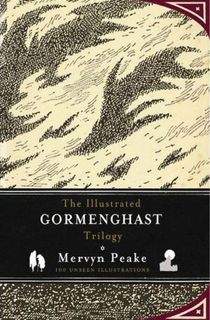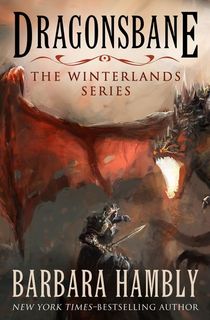The best writers are often the best readers. It’s hard to come up with new twists or innovations if you don’t have a solid foundation in what came before you. Plus, one great fantasy novel can inspire someone to pursue the same career.
It should come as no surprise, then, that many of the most popular fantasy authors love to sing the praises of the novels that most moved them. It’s not hard to find their favorites—really, the only difficulty is in narrowing down their picks to one entry.
We often ask our friends for book recommendations, or try websites like The Portalist searching for new inspiration. But if we trust these authors’ tastes enough to read what they make, it should be easy to appreciate the stories they love. Here are the favorite books of George R.R. Martin, Neil Gaiman, Patrick Rothfuss, and more.
Neil Gaiman's Favorite Fantasy Book

Shadow & Claw
Neil Gaiman is one of the few authors on this list to unequivocally state his favorite novel. In a list of his favorite stories for One Grand Desert Island Books, Neil Gaiman called Shadow & Claw the "best science fiction novel of the last century."
However, even Gaiman is cheating here because Shadow & Claw represents the combination of Gene Wolfe novels. The first is The Shadow of the Torturer, which starts a four-book series called The Book of the New Sun. The story follows Severian, an apprentice in a guild of torturers. The second is its sequel, The Claw of the Conciliator, which takes off shortly after Book 1. While Gaiman called the works science fiction, there are plenty of fantasy elements to go along with it, from ancient relics to mysterious healing powers.
Gaiman isn't the only one to praise The Book of the New Sun, either. Publishers Weekly called the series "a masterpiece of science fantasy comparable in importance to the major works of Tolkien and Lewis," while Ursula K. Le Guin called it "a masterpiece."
Neil Gaiman's top 10 recommendations:
- Shadow & Claw by Gene Wolfe
- Lud-in-the-Mist by Hope Mirrlees
- Archer's Goon by Diana Wynne Jones
- London Labour and the London Poor by Henry Mayhew
- Jonathan Strange and Mr. Norrell by Susanna Clarke
- Horns by Joe Hill
- Alec: The Years Have Pants by Eddie Campbell
- Bleak House by Charles Dickens
- Lord of Light by Roger Zelazny
- The Man Who Was Thursday by G. K. Chesterton.
Ursula K. Le Guin's Favorite

The Illustrated Gormenghast Trilogy
In a 2015 interview with The New York Times, legendary author Ursula K. Le Guin did her best to avoid questions about the best authors and writers. "I always dodge this question," she said, "because it forces me into talking about literature as a horse race.... I have opinions and favorites, but listing them seems tiresome, and anyhow, if I tried I know I'd leave out half the people I really wanted to mention."
When asked about her personal favorites, Le Guin admitted that it often changed depending on whose works she was reading at the time. She did, however, mention five fantasy stories that she returned to again and again. Among them was the Gormenghast series, which begins with Titus Groan. Gothic fantasy full of intrigue and anti-hero plots, Titus Groan was ahead of its time when it was published in 1946 and remains a classic today.
Other fantasy stories that Ursula K. Le Guin loved:
- Alice's Adventures in Wonderland by Lewis Carroll
- The Jungle Books by Rudyard Kipling
- The Sword in the Stone by T.H. White
- The Lord of the Rings by J.R.R. Tolkien
J.R.R. Tolkien's Favorite

Beowulf
It should come as no surprise that a writer who loved mythology and ancient poems so much should choose such a story among his favorites. Rather than a list of books to read, Tolkien took up his pen to write an entire lecture on Beowulf's positive qualities, called "Beowulf: The Monsters and the Critics".
Tolkien concludes with the sort of recommendation that most writers would kill for: "There is not much poetry in the world like this; and though Beowulf may not be among the very greatest poems of our western world and its tradition, it has its own individual character, and peculiar solemnity; it would still have power had it been written in some time or place unknown and without posterity, if it contained no name that could now be recognized or identified by research. Yet it is in fact written in a language that after many centuries has still essential kinship with our own, it was made in this land, and moves in our northern world beneath our northern sky, and for those who are native to that tongue and land, it must ever call with a profound appeal—until the dragon comes."
You can certainly see the influence that Beowulf had on Tolkien, especially in the epic poem's final act, which depicts a king's battle against a treasure-hoarding dragon. If that's not enough, it's worth noting that Tolkien completed his own translation of Beowulf, which he finished in 1926.
Some of Tolkien's other favorite authors, according to Tolkien's Modern Reading by Holly Ordway.
- James Joyce
- Beatrix Potter
- Rider Haggard
- Edith Nesbit
- William Morris
- Kenneth Grahame
Brandon Sanderson's Favorite

Dragonsbane
Given the pace at which Brandon Sanderson publishes, it should come as no surprise that he reads at a voracious rate, too. In a Q&A post on his blog, Sanderson detailed a huge list of suggestions for readers of a variety of ages. However, one book he singled out was Dragonsbane by Barbara Hambly, which he says "was one of the books that got me into Fantasy."
Interestingly, he says that the novel was an unconventional recommendation by one of his teachers. "Everyone likes to give teens books about teenagers—but this book is about a middle-aged woman. So it's not a book that normally would have been given to someone like I was. But I had a smart teacher who knew that I needed something more."
The titular Dragonsbane is actually a man called John Aversin. As the only living man ever to kill a dragon, Aversin finds himself in high demand when the Black Dragon seizes the Deep of Ylferdun. A brave young man named Gareth is sent to retrieve him, and they are accompanied by a sorceress named Jenny Waynest. Together, the trio must find a way to challenge not only the outside dangers, but the threats that come from within the decadent Court, as well.
Other books Brandon Sanderson recommends:
- Going Postal by Terry Pratchett
- Dragon Prince by Melanie Rawn
- The Hundred Thousand Kingdoms by N.K. Jemisin
- The Black Prism by Brent Weeks
- The Name of the Wind by Patrick Rothfuss
George R.R. Martin's Favorite

The Dying Earth
Talk about a flex: When asked about his favorite book, George R.R. Martin quoted himself. "A reader lives a thousand lives before he dies," he said. "The person who does not read lives only one. And I have lived a thousand lives." It's clear, however, that Jack Vance's work holds a special place in Martin's heart. Not only did Martin say that he returns to his favorite Vance books every few years, but after Vance's death in 2013, Martin paid tribute with an anthology entitled Songs of the Dying Earth, featuring original stories from writers like Neil Gaiman, Robert Silverberg, and Mike Resnick.
The first book in the series, The Dying Earth, is only 175 pages and was published in 1950. It contains six stories, including a sword and sorcery tale titled "Mazirian the Magician" and a science fiction entry called "Liane the Wayfarer". Three other books followed in The Eyes of the Overworld, Cugel's Saga, and Rhialto the Marvellous. While some of the stories are novels and others a collection of shorter stories, there's no question about Vance's quality. Upon the completion of the Dying Earth books, Locus ranked it among the best fantasy stories of all time.
Watch George R.R. Martin speak more on his favorite books:
Patrick Rothfuss's Favorite

The Last Unicorn
In a blog post for Barnes & Noble, Rothfuss (who recently announced a new novella of his own) made things plain. "Simply said, The Last Unicorn is the best book I have ever read. The language is gorgeous without being arty or pretentious. The story is smooth and perfect as a pearl. The characters will ride close to my heart until the day I die. I allow myself to re-read it once a year. Every year, I’m worried it won’t live up to my expectations. Every year it’s even better than I remember.
“You need to read it. If you’ve already read it, you need to read it again.”
When the unicorn ventures out from the safety of her lilac wood, she finds both joy and loss. Joined by a bumbling magician called Schmendrick and a woman named Molly Grue, the unicorn faces the creature that drove her kind to extinction in one of the best fantasy books ever written.
You can find a full list of Rothfuss's book recommendations on Good Books, which includes:
- Snow Crash by Neal Stephenson
- The Bloody Chamber by Angela Carter
- The Princess Bride by William Goldman
- The Dragonbone Chair by Tad Williams
- The Heralds of Valdemar by Mercedes Lackey
Stephen King's Favorite

Watership Down
Stephen King agreed to share with Goodreads a list of his ten favorite books ... with a pretty big caveat. He said, "Of course, any list like this is slightly ridiculous. On another day, ten different titles might come to mind." However, it's clear that on the day in question, King was thinking about books surrounding dystopian governance. The list included William Golding's Lord of the Flies, George Orwell's 1984, and Cormac McCarthy's Blood Meridian.
(It also included The Lord of the Rings, because why not?)
In Watership Down, the rabbits of Hampshire in southern England have their own culture, beliefs, and language. The story follows their journey, from the destruction of their warren to new lands on the hill of the titular Watership Down. Along the way they encounter dangers and temptations, which work as an allegory for our own ever-evolving society.
Stephen King's 10 favorite books:
- Lord of the Flies by William Golding
- Ship of Fools by Katherine Anne Porter
- Watership Down by Richard Adams
- The Orphan Master's Son by Adam Johnson
- the Hair of Harold Roux by Thomas Williams
- Invisible Man by Ralph Ellison
- Blood Meridian by Cormac McCarthy
- 1984 by George Orwell
- American Pastoral by Philip Roth
- The Lord of the Rings by J.R.R. Tolkien





